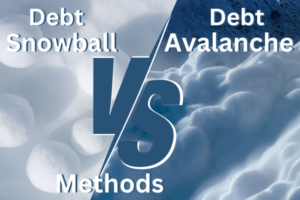Nobody’s perfect. When it comes to personal finances, this statement rings especially true. By making yourself aware of the common financial blunders that people make, you may just be able to avoid making them yourself which can help eliminate debt even faster. Here are some of the most common money mistakes to avoid.
6 Money Mistakes People Make
Ignoring bills once they’ve been automated
Automating your bills is an efficient way to make sure that everything gets paid on time, especially if you’re in debt management. It also takes a basic financial task of your plate. BUT it is important that you still review your bills and statements every month. Make sure there have not been any unauthorized charges on your credit card. Look for any extra charges a service provider may have slipped in as well.
Relying on credit for emergencies
Believing you don’t need an emergency fund because you have your credit card for unexpected emergencies is a big mistake. When you use your credit card for emergencies instead of cash you are paying 10-20% (or higher) in interest. Instead, sock money away in an emergency bank account and EARN interest on it until an emergency occurs. Managing credit card debt should be limited to purchases you can payoff that month in full.
Spending money you don’t have yet
Spending money you don’t have in your hands is popular when it comes to tax returns and holiday bonuses. I have to admit I almost fell into the trap this year. I told myself, “Well I know I’m getting a Christmas bonus so I will just buy this gift now and when I get my bonus I’ll put the money right into my account.”
Chances are you will splurge and tell yourself that your bonus money will replenish your bank account and then once the bonus comes, you will spend it without even realizing it. You also have to be careful because you may think you’re getting more than you actually get. Wait until the cold hard cash is in your hand to spend it. Or better yet use it to start an emergency fund or eliminate debt.
Paying only the minimums
Definitely one of the biggest money mistakes to avoid. If you are only paying the minimum payment on your credit cards every month, that means you are paying more than the original purchase price on almost everything you’ve bought. The best way to manage credit card debt is to pay off the full balance each month.
Spending more than you earn
Spending more than you earn means you are accumulating debt. Spending as much as you earn means you are living paycheck to paycheck. Neither is a good way to live. In order to be in a good financial situation and build wealth, you need to spend less than you earn.
This may mean changing your lifestyle to spend less or getting another job to earn more. You decide what works for you. Make sure you are using a budget. Budgeting will help if or when you need to manage credit card debt.
Not realizing that small purchases add up to a big expense
It may not seem like a big deal to spend $7 on lunch and $3 on coffee every day of the work week. But when you look at the big picture you are spending $50 per week which adds up to $2,600 per year. Then add in dining out once a week for $50 and renting a movie off the TV every other week. All these little purchases add up. This is one of the money mistakes to avoid.
Instead of spending frivolously here and there, you could use that money to make an extra mortgage payment or a ton of extra car payments. I’m not saying don’t enjoy yourself every once in while; I’m just saying to consciously think about what you’re spending money on and budget for it to help your finances and managing credit card debt.
If you’re struggling to pay off debt, ACCC can help. Schedule a free credit counseling session with us today.







